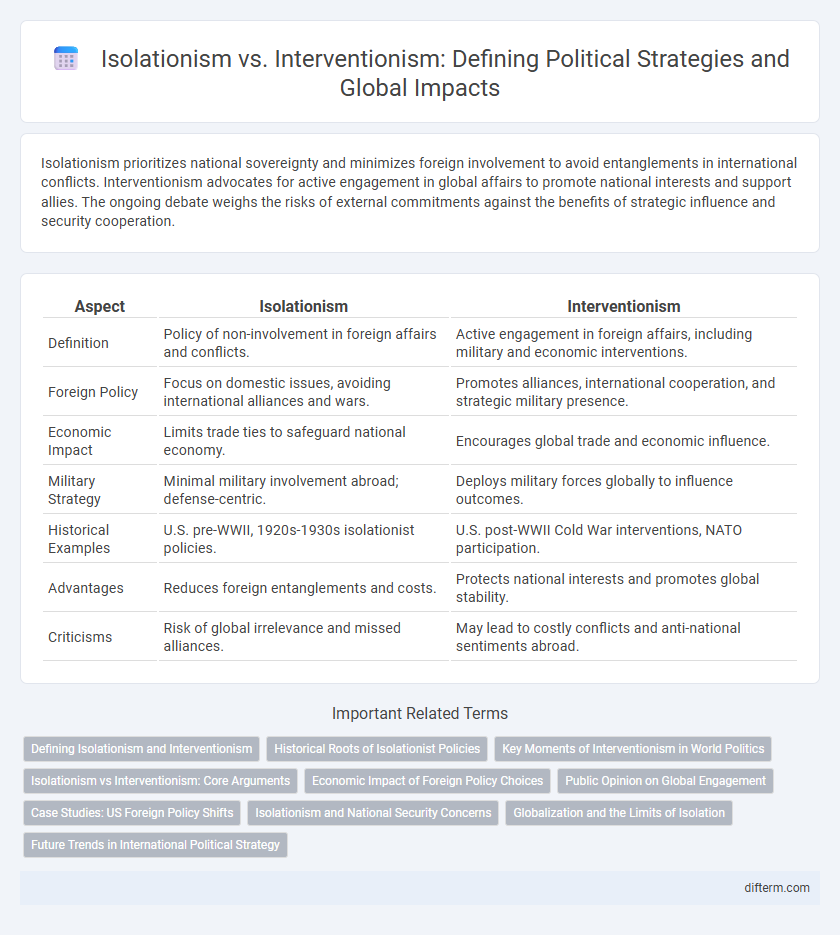Isolationism prioritizes national sovereignty and minimizes foreign involvement to avoid entanglements in international conflicts. Interventionism advocates for active engagement in global affairs to promote national interests and support allies. The ongoing debate weighs the risks of external commitments against the benefits of strategic influence and security cooperation.
Table of Comparison
| Aspect | Isolationism | Interventionism |
|---|---|---|
| Definition | Policy of non-involvement in foreign affairs and conflicts. | Active engagement in foreign affairs, including military and economic interventions. |
| Foreign Policy | Focus on domestic issues, avoiding international alliances and wars. | Promotes alliances, international cooperation, and strategic military presence. |
| Economic Impact | Limits trade ties to safeguard national economy. | Encourages global trade and economic influence. |
| Military Strategy | Minimal military involvement abroad; defense-centric. | Deploys military forces globally to influence outcomes. |
| Historical Examples | U.S. pre-WWII, 1920s-1930s isolationist policies. | U.S. post-WWII Cold War interventions, NATO participation. |
| Advantages | Reduces foreign entanglements and costs. | Protects national interests and promotes global stability. |
| Criticisms | Risk of global irrelevance and missed alliances. | May lead to costly conflicts and anti-national sentiments abroad. |
Defining Isolationism and Interventionism
Isolationism refers to a foreign policy approach where a nation avoids involvement in international political and military conflicts to prioritize domestic interests and maintain national sovereignty. Interventionism involves active engagement in global affairs, including military, economic, and diplomatic actions, to influence international outcomes and promote national security. These contrasting strategies shape a country's role on the world stage and impact global stability and alliances.
Historical Roots of Isolationist Policies
Isolationist policies in American politics trace back to the early 19th century, heavily influenced by the Monroe Doctrine of 1823, which asserted opposition to European colonialism in the Western Hemisphere while avoiding entanglement in foreign alliances. This approach dominated U.S. foreign policy through both World Wars, driven by the desire to protect national sovereignty and economic interests without engaging in overseas conflicts. Key historical moments such as the interwar period and opposition to the League of Nations solidified isolationism as a response to the trauma of World War I and skepticism about international commitments.
Key Moments of Interventionism in World Politics
Key moments of interventionism in world politics include the U.S. entry into World War I in 1917, signaling a shift from isolationism to active global engagement. The Cold War era marked continued interventionist policies through proxy wars, such as the Korean War and Vietnam War, aimed at containing communism. More recent interventions include NATO's involvement in the Balkans during the 1990s and the U.S.-led invasions of Afghanistan in 2001 and Iraq in 2003, demonstrating sustained international military engagement.
Isolationism vs Interventionism: Core Arguments
Isolationism prioritizes national sovereignty and non-involvement in foreign conflicts to protect economic interests and avoid military entanglements. Interventionism advocates for active engagement in global affairs to promote security, human rights, and economic influence. The core debate centers on balancing national security risks against global responsibilities and strategic advantages.
Economic Impact of Foreign Policy Choices
Isolationism limits international trade opportunities, leading to slower economic growth due to reduced market access and foreign investment. Interventionism often boosts economic activity by opening new markets and promoting global partnerships, though it can increase government spending and risk economic entanglements. The choice between these policies significantly shapes national GDP, employment rates, and trade balances.
Public Opinion on Global Engagement
Public opinion on global engagement reveals a complex divide between isolationism and interventionism, with polls showing that approximately 55% of Americans favor prioritizing domestic issues over foreign involvement. Surveys indicate that concerns about national security and economic costs drive isolationist sentiments, while proponents of interventionism emphasize the importance of global leadership and humanitarian responsibility. This split shapes policy debates, influencing decisions on military interventions, international trade agreements, and diplomatic efforts.
Case Studies: US Foreign Policy Shifts
The United States' foreign policy oscillated between isolationism after World War I, emphasizing non-involvement in global conflicts, and interventionism during World War II and the Cold War, driven by containment of communism and protection of national interests. Key case studies include the 1930s Neutrality Acts restricting military support and the 1947 Truman Doctrine signaling a proactive stance against Soviet expansion. This strategic shift underscores the impact of geopolitical threats on American diplomatic and military engagement worldwide.
Isolationism and National Security Concerns
Isolationism emphasizes minimizing foreign entanglements to protect national sovereignty and reduce risks associated with international conflicts. Advocates argue that avoiding military interventions and alliances limits exposure to wars that could threaten domestic stability and economic security. Critics, however, warn that extreme isolationism may undermine early threat detection and weaken global influence crucial for long-term national security.
Globalization and the Limits of Isolation
Isolationism struggles to address the complexities of globalization, as economic interdependence and transnational challenges demand cooperative intervention. The limits of isolation become evident when global crises such as pandemics, climate change, and security threats require coordinated international responses. Interventionism, therefore, gains strategic importance in managing global risks while balancing national sovereignty and global responsibilities.
Future Trends in International Political Strategy
Emerging global challenges such as cyber warfare, climate change, and transnational terrorism are pushing states toward nuanced international political strategies that blend selective interventionism with guarded isolationism. Technological advancements in surveillance and military capabilities enable countries to adopt more precise and limited interventions, reducing costs while maintaining influence. Regional alliances and multilateral organizations are expected to play an increasing role in balancing the tension between isolationist tendencies and interventionist policies in the evolving geopolitical landscape.
Isolationism vs Interventionism Infographic

 difterm.com
difterm.com